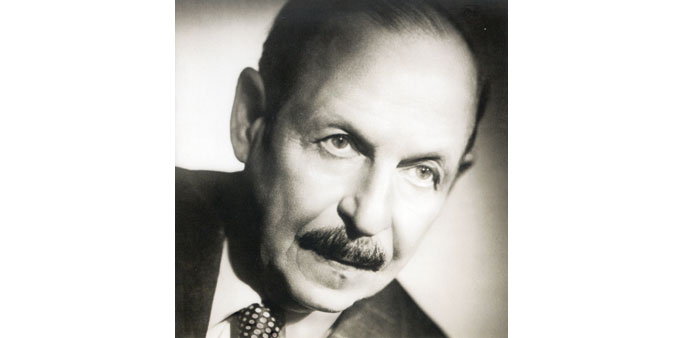The concert will feature beloved melodies of Kalman works including Countess Maritza, The Bayadere, The Circus Princess.
By Umer Nangiana
They say no minute goes by in the world without a melody of him being heard either on stage, on television, on the radio, at a concert or gala. And most often it is the melodies of The Csardas Princess (aka Die Csardasfürstin).
The melodies from the legendary composer Emmerich Kalman, born 133 years ago, are coming to Doha in one of the most exclusive operetta concert experiences at one the of most exclusive venues, Katara Opera House.
‘The Csardas Princess 100,’ Operatta Gala concert, will be performed by soloists, Ballet and Orchestra of Budapest Operatta and Musical Theatre on 16 of this month. The audience will be entertained by the legendary melodies of Kalman.
The Csardas Princess is one of the melodies with which the composer won the first place among leading composers of the era. The performance will celebrate the composer and his best piece, which premiered exactly 100 years ago.
Emmerich Kalman was born on October 24, 1882 in the Hungarian town of Siofok. His father was a well-to-do businessman but was reduced to bankruptcy during Kalman’s childhood, an experience that left a lasting mark on young Kalman’s imagination.
The family moved to Budapest, then one of the twin capitals of the Austro-Hungarian Empire, and despite his father’s determination that Kalman should make a career in law, it soon became evident that the call of music was too strong to be ignored.
Originally Kalman’s ambition was to be a concert pianist, but this was thwarted by an affliction to his arm-muscles. “I was as one who had fallen from the clouds, a very serious and very sad young man,” said Kalman of himself.
Indeed, according to that great historian of Viennese operetta, Bernard Grun, Kalman remained that way inclined all his life. “Even at times of his greatest triumphs,” wrote Grun, “the stocky man with the friendly blue eyes generally looked very serious and very sad. Rapture and high spirits were as foreign to his nature as bad manners and uncouthness.”
Kalman studied composition in Budapest with Professor Koessler, who also taught Bartók and Kodály. In 1907 his serious compositions won him the prestigious Franz-Joseph Prize of the City of Budapest, but within a year he had registered his first outstanding success as an operetta composer.
This was Herbstmanöver (Autumn Manoeuvres), which not only brought him to the attention of the operetta moguls in Vienna, but even reached the stages of London and New York.
Within a couple of years Kalman had moved to Vienna, a city which, since the rebirth of operetta with Lehár’s irresistible Merry Widow in 1905, had been gripped by a positive epidemic of operetta fever.
With Der Zigeunerprimás (1912) Kalman achieved what he himself always regarded as his finest score. In 1915, Kalman produced what was to remain his greatest popular success, Die Csárdásfürstin (The Gypsy Princess).
Outstanding among his later works were the enchanting Gräfin Maritza (Countess Maritza) (1924) and Die Zirkusprinzessin (The Circus Princess) (1926), and at least four of his other operettas were a great deal more than merely passing successes.
He studied music theory and composition at the National Hungarian Royal Academy of Music (then the Budapest Academy of Music), where he was a fellow student of Béla Bartók and Zoltán Kodály under Hans Kössler.
Kalman and Franz Lehar were the leading composers of what has been called the “Silver Age” of Viennese operetta during the first quarter of the 20th century.
The concert at Katara Opera House will also feature the beloved melodies of other Kalman works, Countess Maritza, The Bayadere, The Circus Princess and others besides songs by other popular Hungaria operetta composers, including Franz Lehar, Paul Ábrahám, Jen Huszka, Albert Szirmai, in a genuine Viennese, Parisian, Oriental and Hungarian spirit.
The visuals of the show are made unique by breath-taking compositions and animated effects, while the organisers are planning to employ outstanding scenery, lighting and sound that fit a real high-scale theatrical show.
The performing artists will be accompanied by Budapest Operetta and Musical Theatre’s symphonic orchestra, led by Krisztián Balassa, and the ballet ensemble.
The gala show, in the direction of KERO(R), is set to be one of the highlights of the year, with its exciting visuals, original concept and elegant atmosphere.

